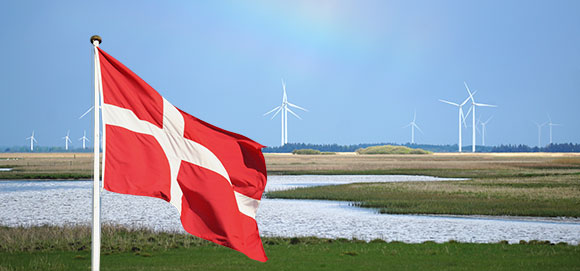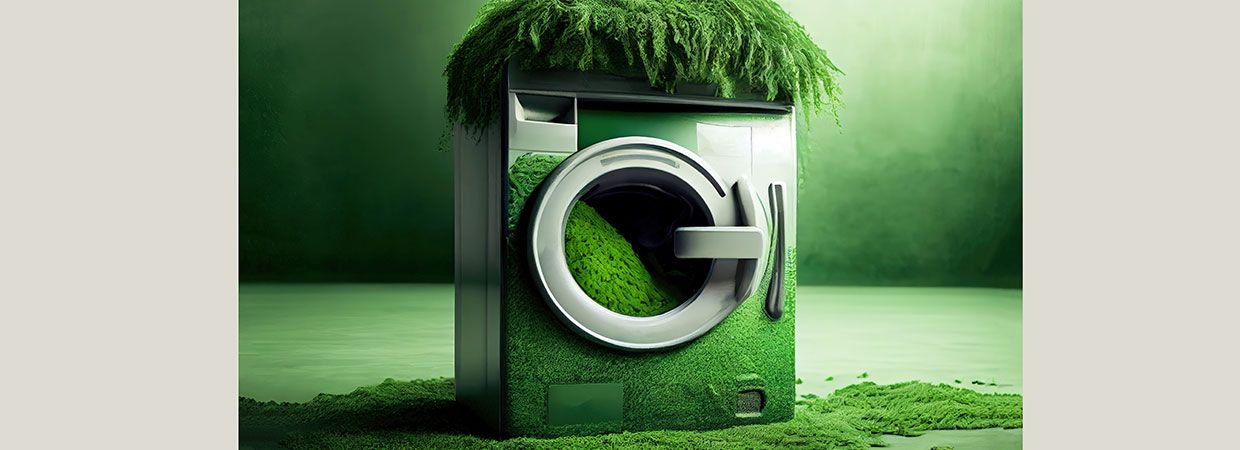english – Greenwashing ban and sustainable tenders: What Denmark does differently
Learning from others who are already ahead in the field of sustainability - under this motto, the RSV has now obtained useful input from Denmark. At a working group meeting, Kristian Hjelm from Per Aarsleff A/S reported on the sustainability activities of the northern neighbors. In Denmark, proof of sustainability is increasingly part of the tender requirements for the rehabilitation of sewers.

"The focus used to be on costs and quality - now it's also about sustainable production," says Hjelm, who is responsible for the sustainability of sewer rehabilitation products in the group, among other topics. Per Aarsleff, an internationally active group with an annual production of more than 1000 kilometers of pipe liners, has been involved in the development of both glass fibre liners and needle felt liners for more than 40 years.
Denmark plans climate neutrality by 2050
The Danish government has issued the goal of climate neutrality by 2050[1]. The country with almost 6 million inhabitants is already in the middle of the energy transition. Huge wind farms, massive reconstruction of infrastructures and the promotion of e-mobility make Denmark one of the role models in terms of CO2 savings. "It is also part of the national growth strategy. We in Denmark see it as an opportunity to export know-how and initiatives to other countries," says Hjelm.
Greenwashing prohibited under charge
Interesting: Like in Germany, the topic of sustainability has long been part of the daily social debate. Because the weather, for example, has always been of great interest in Denmark, the Danes are particularly interested in such topics. Greenwashing, however, is forbidden[2], according to Hjelm. "It is not allowed to present oneself as a green and sustainable company if this is not clearly proven. There are companies that have already had to pay fines[3]. If you publish a picture of your company and add trees or grass without proving its sustainability, that is already seen as greenwashing," Hjelm says. In his opinion, this regulation makes sense: "If the rules were not so strict, it would be a marketing issue - what we need, on the other hand, is cooperation and partnership".
It is not unlikely that such a greenwashing law could also come in Germany: a corresponding directive is currently being prepared at the EU level. All member states must implement it within a certain period of time.
https://environment.ec.europa.eu/topics/circular-economy/green-claims_en
Tenders with sustainability factor
Unlike in Germany, Danish bids in bidding procedures are not only awarded on the basis of costs, but also according to the quality and organization of the project team. Recently sustainability has also become a criteria - traditional tendering procedures are being adapted accordingly, also in sewer rehabilitation. Hjelm used two tenders as examples to illustrate what these look like in concrete terms. In one example, sustainability was assessed at 30 percent. In addition to the existence of ISO certificates, concrete measures such as alternative fuels, reducing use of drinking water during flushing, waste disposal plans and CO2 measurements during construction were demanded. Social responsibility is also part of the requirements - i.e. health and safety for the workers.
Denmark is one of the pioneers in CIPP in Europe. The firs installation took place in 1978 - five years before the German premiere. The trenchless rehabilitation of sewers is a natural part of the activities of many municipal wastewater associations, which manage the sewer network as a public-law corporation. "We see that the network operators are extremely committed to sustainability, but at the same time they are concerned that this could also reduce competition."
"Positive mindset on all sides"
In view of the political pressure, regular workshops on the topic have become established in the Danish sewer rehabilitation industry, Hjelm reports. Specialist lawyers talk about sustainable procurement requirements. Manufacturers and suppliers talk about developments in procedures and network operators exchange ideas on how to launch tenders with sustainability in mind. "These are good and open discussions with a positive mindset on all sides," says Hjelm, who at the same time points to a growing market of consultants who support both network operators and the companies. Incidentally, the increasing focus has an important side effect: the technical competence of network operators and companies in Denmark has accelerated enormously in recent years,
Push for trenchless methods
By the way, trenchless sewer rehabilitation is seen in the workshops as the most sensible method in the long term for maintaining pipes sustainably. Hjelm: "When calculations are made on the environmental footprint, trenchless methods usually account for 10 to 20 percent - compared to traditional trenching methods. If no asphalting is done after a pipe is laid, the rate is 40-50 per cent. Even though it is known that our products are based on fossil raw materials - they are still ahead in terms of CO2 footprint and impact on the environment."
For the study Hjelm quoted from, a Danish consulting firm had used a comparison of 18 installations, from DN 200 to DN 600, on behalf of a network operator, comparing CIPP against digging methods on a greenfield site. "With CIPP, the CO2 emissions were comparable to the CO2 emissions of the offices of client and the engineering company for this project together. That was an eye-opener for everyone."
Not everything is already well thought out….
Hjelm also reported that the focus on sustainability is leading to an increasing debate about individual processes and materials. "Light curing is better than heat curing, styrene-free liners are green - when we hear statements like that, we go into discussions with customers because we see it a bit differently in some cases, especially the thing about styrene-free resins," Hjelm said. In the confined environment of a pipe liner, he says, you basically have low styrene emissions and when comparing the product declarations of styrene-free resins, they have a worse CO2 balance. "We need longer curing times on construction sites to achieve the same qualities - and that costs more fuel. We are not saying that styrene-free resins are bad, but we think it is important to discuss this objectively. There is no such thing as "black and white".
Other aspects that are required in tenders are also worth discussing, according to Hjelm. For example, in some tenders, bidders get extra points if they use HVO diesel in vehicles - diesel made from vegetable oils and fat waste, the use of which is also being discussed at government level in Germany. "I don't know if this is the right way to go. Instead of improving our mindset in the long term or investing in new technologies, we just have higher costs for now."
There are also points to be made at times for the use of fully electric vehicles. Hjelm: "For us it is difficult – The electrical truck is still at an early stage in terms of cost, infrastructure and range and we haven't found the perfect solution yet." Aarsleff will soon receive a gas-powered truck to use in Oslo. The background: it is no longer permitted to drive in the Norwegian capital with vehicles powered by fossil fuels - not even HVO diesel from 2025. "If customers force us as contractors to do this, we have to make a decision: Either we abandon the project or we develop further. In the first case, we will no longer be on the market in a few years. So, we have to develop in order to survive and grow in the market. but it costs a lot of money," Hjelm summarized.
[1] https://ens.dk/ansvarsomraader/energi-klimapolitik/fakta-om-dansk-energi-klimapolitik/dansk-klimapolitik
[2] https://www.forbrugerombudsmanden.dk/alle-emner/forbud-mod-vildledning/miljoemaessige-og-etiske-udsagn-i-markedsfoeringen/
[3] https://grakom.dk/nyheder/foerste-boede-for-greenwashing/
Title image source: Adobe Stock
